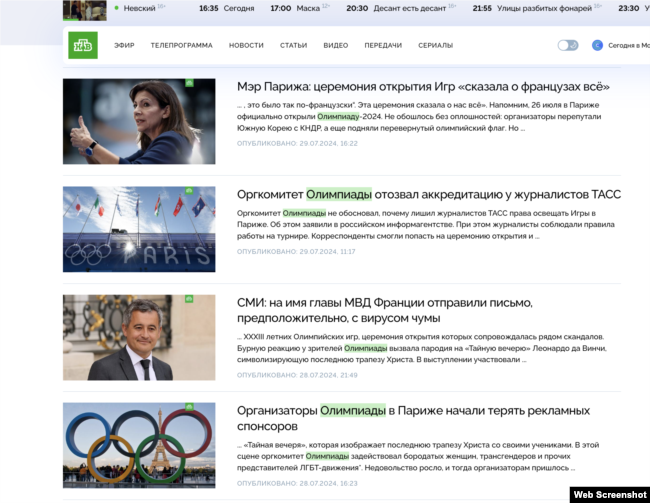In June, a month before the official opening of the Paris Olympics, Russia launched a massive disinformation campaign against the event.
A Microsoft report says that Russia’s disinformation campaign began after the International Olympic Committee (IOC) allowed Russian athletes to compete only as neutrals.
The campaign included fake news websites and a documentary aimed at smearing the IOC and creating the impression that the Olympics would be marred by violence. Kremlin propaganda literally created its own version of the Olympics, one that aligns with all the “values” the Russian government seeks to impose on its citizens and to incite disgust in European countries.
What kind of picture can a person who knows nothing about the Paris Olympics and wants to access information on Russian media sites see?
Let’s go, for example, to the news portal of one of the main Russian TV channels – NTV. Since July 26 (the opening day of the Olympics), 18 news items dedicated to the games have been published on the channel’s website. The picture that emerges is horrifying: the opening ceremony generated scandals, the head of the Ministry of Internal Affairs was sent a letter containing the plague virus, Macron was booed, and the Italian journalist Angelo Giuliano was so horrified by what was happening that he asked for asylum in Russia.
“Such an opening of the Olympics makes me want to vomit,” NTV quotes Victoria Komova, a two-time silver medalist at the 2012 Olympics in artistic gymnastics.

Similar comments are on the site, as well as on Perviy channel: “A disgusting thing that shocked the world: France showed how you can insult billions of people on the planet, turning the opening of the Olympic Games into a Satanic spectacle.” Transvestites are in the role of apostles, and the flag of the sports movement is in the hands of the horseman of the Apocalypse,” says the presenter and summarizes the correspondent’s story: “About how the French kicked ass on the Seine – Grigory Emelyanov.”

The persistence with which the narrative of “insulting the feelings of believers” has been promoted on social networks is amazing and has a strong motivation behind it. As the “Можем объяснить” project writes, citing sources from a state agency and a federal publication, the media have received instructions from the presidential administration of the Russian Federation to scold the Olympics and cover in great detail all the scandals associated with it. “Since Russia was not allowed to participate in the Olympics, we must show that we should not have gone there,” a source from the state agency told the “Можем объяснить” project.
According to the interlocutor, sports correspondents intentionally call experts who can say as many nasty things about the Olympics as possible.
“The Last Supper”, pulled by the ears.
The words “demonism” and “satanic” appear more often than others in Russian materials about the Olympics – this is due to the fact that a parody of Leonardo da Vinci’s “The Last Supper” was allegedly presented at the opening ceremony. But the scene itself, which caused an explosion of indignation on social networks, is noticeably different from the famous fresco. Firstly, at the opening there was not a table, but a podium, secondly, there were not 12 people sitting behind it, but much more, and thirdly, on the podium itself sat a man depicting the god of pleasures and feasts. Bacchus (in Greek mythology – Dionysus).
The show’s director, Thomas Jolly, stated in an interview with the French press that his production contained no reference to the Last Supper, but depicted a celebration on Mount Olympus (which is logical, given that the games are Olympic).
The abundance of all these inconsistencies reminded a number of social media users of an old Soviet joke about a man who complained about the women’s bathroom across the street, and when they came to him from the housing office and said that nothing could be seen, he advised him to climb up the closet, from where he could see better.
The “gender” scandal
On August 1, at the Paris Olympics, Imane Khalif from Algeria defeated Angela Carini from Italy in a boxing match. At 46 seconds, after several blows, Carini refused to continue the fight and burst into tears. After this, the news spread widely in the media and social networks that Khalif is, in fact, a transgender woman (Lenta, MK, AiF, Mash, Reedus, Strana.ua, Novini, News.ru, etc.). The fact that the Algerian woman is a biological man was directly or indirectly stated by such famous personalities as Donald Trump, Elon Musk, Joanne Rowling and others. The message sparked a wave of indignation around the world, including among Moldovan spectators of the Olympics. Rumors about the boxer’s gender identity had been circulating even before she stepped into the ring in Paris, but it was only after her fight with the Italian that the topic became a hot topic on the internet.
Verdict – A Fake
There is no evidence that Imane Khalif is transgender. The misinformation began to spread after Khalif failed an eligibility test for the 2023 World Boxing Championships in New Delhi, according to the International Boxing Association (IBA), and was disqualified before her gold medal bout. The tests have sparked a massive debate over gender rules this week at the Paris Olympics.
The boxing world has learned to expect almost anything from the Russian-dominated governing body, which last year received an unprecedented lifetime ban from the Olympics. In fact, the IBA has not competed in an Olympic boxing event since the 2016 Rio de Janeiro Games.
The organization has been accused for decades of a complete lack of transparency in almost every aspect of its activities, especially in recent years. Many people took the IBA’s statements about Khalif at face value, turning the dispute over the athlete’s eligibility into a heated debate over gender identity. The organization later refused to disclose the details of the test, and its president did not provide evidence for his claim that the boxer was born a man.
It is also important to note that the Algerian woman previously participated in various tournaments without problems, including the Tokyo Olympics, and despite some successes, she lost in battles several times and has yet to become a world or Olympic champion.
Kremleov at the head of the association
About six years ago, AIBA elected Gafur Rakhimov, an Uzbek businessman described by the US Treasury as a crime boss, as its president. Rakhimov, who denied the allegations, eventually resigned in July 2019, a month after the IOC suspended relations with him. The group changed its name to the IBA and elected Umar Kremleov, a Russian boxing official and acquaintance of Russian President Vladimir Putin. The Kremlin cited Gazprom as its biggest funder and moved most of the IBA’s operations to Russia.
All of this suited the IOC, especially given its recommendations not to allow Russian athletes to compete with flags and anthems after Russian troops invaded Ukraine.

